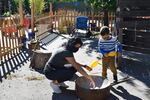The "preschool for all” ballot measure seeks to create a universal preschool system in Multnomah County, so that every 3- and 4-year-old can attend preschool tuition free.
Related: OPB’s 2020 election coverage, ballot guide and results
The plan is the result of years of work led by Multnomah County Commissioner Jessica Vega Pederson, involving providers and parents in the development of the plan.
Commissioners voted to send the measure to the ballot in August.
Measure 26-214 would create a system supporting a range of providers, whether they’re based at homes, schools, centers or at Head Start facilities. The goal is to offer various schedules and prioritize access for children who have historically been less likely to attend preschool. That includes students with disabilities, students of color and children living in foster care or affected by homelessness.
Preschool has long been considered important in a child’s development. But it can be expensive and unaffordable for some families — and hard to find. A study last year by Oregon State University found all 36 counties in Oregon qualified as “child care deserts” based on the lack of “regulated child care” in the state.
If approved by voters, the Multnomah County effort would create an estimated 7,000 new, tuition-free preschool slots by 2026.

Teacher Susana Montano works with a preschool student at Escuela Viva in Southeast Portland.
Elizabeth Miller / OPB
The Multnomah County preschool measure outlines support for both existing and new providers, as well as support for teachers. Under the measure, preschool teachers at “participating providers” would be paid on par with kindergarten teachers. Assistant preschool teachers would receive pay increases as well.
Angie Garcia runs Escuela Viva, a Portland preschool with two sites. She said she’s seen staff members who wanted to stay have to leave because of the pay.
“If we as a community want our educators to stay in the field of early childhood education, it needs to be a sustainable wage,” Garcia said. “It needs to be more on par with what our public school teachers are paid.”
As a preschool provider, Garcia said this year has been especially tough with COVID-19.
In the first months of the pandemic, child care centers were forced to close or apply to serve the children of essential workers. Some never reopened.
Data collected by Child Care Aware of America showed over 3,600 licensed child care center-based and family child care in Oregon in December 2019. As of July, that had fallen to closer to 2,800.
Providers rely on stable enrollment to survive, with parents paying tuition. Without children enrolled, preschools often don’t have the funds to stay open.

A child plays at Escuela Viva preschool in Southeast Portland.
Elizabeth Miller / OPB
Garcia opened her second site in January, but she said enrollment has been low because of the pandemic.
She said the pandemic has shined a light on the “weak” infrastructure of the early-childhood education system.
“It’s at the mercy of each individual provider,” Garcia said. “If we were all pooled together and we were a solid system, we could actually do work on all of these other pieces that would make it a stronger system.”
Supporters include the leaders of Universal Preschool Now, a competing campaign that merged with the county’s measure this past summer.
“The merged campaign creates and funds a clear path to universality while carefully prioritizing communities of color, and significantly raises wages for an essential and historically undervalued workforce,” read part of the Universal Preschool Now message.
The program would be run by the Department of County Human Services, with an additional community advisory group reviewing and evaluating the program.
There is no organized opposition to the Multnomah County preschool measure.
The tax is new, but it wouldn’t affect every Multnomah County taxpayer.
It’s a marginal income tax on higher-earning households and individuals. If the measure passes, starting in January, individuals with taxable income over $125,000 and households making $200,000 will pay a 1.5% tax on any additional income above those amounts. The tax is higher for individuals with taxable income over $250,000 and households with taxable income over $400,000.
The tax on individuals making over $125,000 and households making over $200,000 will likely be increased by 0.8% in 2026 to “grow the Preschool for All program to full capacity.”



